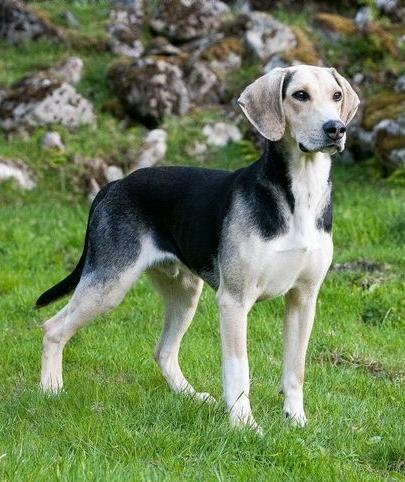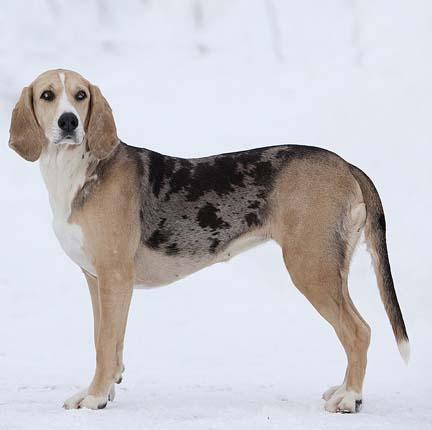- Breed Category: Hound
- Country of Origin: Norway
- Average Height: 50-55 cm (20-22 in)
- Average Weight: 16-22 kg (35-49 lbs)
- Average Life Span: 10-12 years
- Grooming Requirements: Low, occasional brushing
- Exercise Requirements: High, needs daily exercise
- Coat Type: Short, dense
- Coat Color Variations: Black, blue merle, tan
- Shedding Level: Moderate
- Ear Type: Long, droopy
- Tail Type: Long, slightly curved
- Temperament: Friendly, calm, sociable
- Intelligence Level: Moderate
- Barking Tendency: Moderate
- Compatibility with Children: Good
- Compatibility with Other Pets: Generally good
- Training Ease: Moderate, can be stubborn
- Common Health Issues: Hip dysplasia, ear infections
- Dietary Needs: Balanced diet, not overfed
- Energy Level: High
- Drooling Tendency: Low
- Sensitivity to Weather: Tolerates cold well
- Overall Maintenance Level: Moderate
- Original Purpose: Hunting hare
- Year of Recognition by Kennel Clubs: 1994
- Apartment Friendly: Not ideal, needs space
- Best Suited For: Active families, rural areas
- Cost of Ownership: Moderate
- Unique Traits: Excellent scent tracking ability
Think all hounds are the same? Let’s dive into the world of the Dunker, a breed that might just change your mind. Known for their striking appearance and keen hunting skills, Dunkers are a unique breed with a rich history. This article will guide you through their characteristics, history, and care needs, offering a comprehensive look at what makes them special.
The Dunker, also known as the Norwegian Hound, originated in Norway in the 19th century. Bred by Wilhelm Dunker, these dogs were designed for hunting in the rugged Norwegian terrain. Their lineage includes a mix of local scent hounds and Russian Harlequin Hounds, resulting in a breed that’s both resilient and reliable. Today, they’re cherished for their loyalty and distinctive marbled coat.
Early Development and Role in Norwegian Hunting Traditions

The Dunker dog, with its roots firmly planted in the 19th century, was crafted for a specific purpose: to excel in the challenging Norwegian landscape. This breed was not just a product of chance but a deliberate creation by Wilhelm Dunker, who sought to develop a hound that could thrive in Norway’s rugged terrain. By blending local scent hounds with Russian Harlequin Hounds, he achieved a dog that was both tenacious and dependable.
Key Historical Figures
Wilhelm Dunker stands out as the pivotal figure in the Dunker’s history. His vision and dedication to creating a breed suited for Norway’s hunting needs were instrumental. His work laid the foundation for a breed that would become a staple in Norwegian hunting traditions, valued for its ability to track and hunt game with precision.
Physical Characteristics
Dunkers are easily recognisable by their unique marbled coat, a striking feature that sets them apart from other hounds. They possess a sturdy build, with a balanced and athletic frame that supports their hunting prowess. Their keen sense of smell and sharp instincts make them exceptional hunters, while their loyal nature endears them to families.
Appearance and Unique Traits
The Dunker dog is a medium-sized breed, typically weighing between 16 to 22 kilograms. Their marbled coat is a standout feature, often displaying a mix of blue, black, and tan colours that give them a distinctive look. This unique pattern is not just for show; it’s a testament to their rich heritage and breeding.
Beyond their coat, Dunkers have a strong, athletic build, perfect for the demands of hunting. Their ears are long and droopy, adding to their classic hound appearance. But what truly sets them apart is their exceptional sense of smell. This keen olfactory ability makes them outstanding trackers, able to follow scents over long distances and challenging terrains.
Temperament and Behaviour
Dunkers are known for their calm and friendly nature. They’re not just hunters; they’re also great companions. These dogs are loyal and form strong bonds with their families. While they’re generally good with children and other pets, their hunting instincts mean they’re always alert and ready for action. Dunkers thrive on activity and love having a job to do, making them perfect for active households.
Personality and Suitability
Dunkers are a delightful mix of friendly, calm, and determined traits. These dogs are not just about looks; their temperament makes them a joy to have around. They’re naturally friendly, which means they get along well with just about everyone, including kids and other pets. Their calm nature ensures they’re not overly excitable, making them a stable presence in any home.
As family pets, Dunkers are a fantastic choice. They’re loyal and form strong bonds with their human companions. Their determination shines through in their hunting abilities, making them excellent partners for those who enjoy outdoor activities. Whether you’re looking for a family pet or a hunting companion, the Dunker fits the bill perfectly.
Interaction with Children and Other Animals
When it comes to kids, Dunkers are gentle and patient. They’re known to be protective yet playful, making them great playmates. With other animals, they’re generally sociable, though their hunting instincts mean they might need supervision around smaller pets.
Training and Exercise Needs
Dunkers thrive on activity and need regular exercise to keep them happy and healthy. They’re intelligent and respond well to training, especially when it involves tasks that engage their keen sense of smell. A mix of mental and physical challenges will keep them content and well-behaved.
Training, Exercise, and Health

Importance of Early Training and Socialisation
Getting a Dunker off to a good start with early training and socialisation is crucial. These dogs are naturally intelligent and eager to learn, so introducing them to various environments, people, and other animals early on helps them grow into well-rounded adults. This early exposure ensures they’re comfortable in different situations and reduces the likelihood of behavioural issues down the track.
Recommended Training Techniques
When it comes to training, positive reinforcement is the way to go. Dunkers respond well to rewards and praise, making them quick learners. Incorporating scent-based games and tasks can be particularly effective, given their exceptional sense of smell. Consistency and patience are key, as these dogs thrive on routine and clear communication.
Daily Exercise Requirements and Activities They Enjoy
Dunkers are active dogs that need plenty of exercise to stay happy and healthy. Daily walks, playtime, and mental stimulation are essential. They love activities that challenge their tracking abilities, like scent trails or hide-and-seek games. Engaging them in these activities not only keeps them fit but also satisfies their natural instincts.
Health and Lifespan
Generally, Dunkers are a healthy breed with a lifespan of around 12 to 15 years. Regular vet check-ups, a balanced diet, and plenty of exercise contribute to their longevity. Like all breeds, they can be prone to certain health issues, so keeping an eye on their overall well-being is important. With proper care, these dogs can lead long, happy lives.
Health and Care for Dunker Dogs

Common Health Issues
Dunkers are generally robust, but like any breed, they can face specific health challenges. Hip dysplasia and ear infections are among the more common issues. Regular vet visits can help catch these early, ensuring your Dunker stays in top shape.
Average Lifespan and Health Tips
With proper care, Dunkers typically live between 12 to 15 years. To keep them healthy, provide a balanced diet, regular exercise, and mental stimulation. These elements are crucial for their physical and mental well-being.
Preventative Care Recommendations
Preventative care is key. Regular vet check-ups, vaccinations, and dental care are essential. Keep an eye on their ears, as their droopy nature can lead to infections. Clean them regularly to prevent issues.
Grooming and Maintenance
Their marbled coat is low-maintenance but benefits from weekly brushing to remove loose hair and keep it looking its best. Bathing should be occasional, as over-washing can strip natural oils. Regular nail trimming and teeth brushing are also important parts of their grooming routine.
Coat Care and Grooming Routines

Shedding and Seasonal Grooming Tips
The Dunker’s marbled coat is not just eye-catching; it’s also relatively easy to maintain. While they don’t shed excessively, regular grooming is essential to keep their coat healthy and vibrant. A weekly brush will help remove loose hair and prevent matting, especially during shedding seasons in spring and autumn. This routine not only keeps their coat looking great but also reduces the amount of hair around your home.
During seasonal changes, you might notice an increase in shedding. This is perfectly normal and can be managed with more frequent brushing. A good quality brush designed for short to medium coats will do the trick. Bathing should be kept to a minimum to preserve the natural oils in their coat, which help keep it shiny and healthy.
Diet and Nutrition
A balanced diet is crucial for the Dunker’s overall health and well-being. These active dogs require a diet rich in protein to support their energy levels and muscle maintenance. High-quality commercial dog food, supplemented with fresh ingredients like lean meats and vegetables, can provide the necessary nutrients.
Portion control is important to prevent obesity, a common issue in many breeds. Regularly monitor their weight and adjust their food intake as needed. Fresh water should always be available, especially after exercise, to keep them hydrated and healthy.
Nutritional Needs for Optimal Health

Foods to Include and Avoid
For Dunkers, a diet rich in protein is essential to fuel their active lifestyle. High-quality commercial dog food, complemented by fresh ingredients like lean meats and vegetables, provides the necessary nutrients. Avoid foods high in fillers and artificial additives, as these can lead to health issues over time. Steer clear of chocolate, grapes, and onions, which are toxic to dogs.
Feeding Schedules and Portion Recommendations
Establishing a consistent feeding schedule helps maintain a Dunker’s energy levels and prevents overeating. Typically, two meals a day—morning and evening—work well. Portion sizes depend on their age, weight, and activity level, so it’s important to adjust as needed. Regularly monitor their weight to ensure they’re not gaining excess pounds.
Fun Facts and Trivia
Did you know Dunkers are named after their creator, Wilhelm Dunker? Their marbled coat isn’t just for looks; it’s a nod to their unique heritage. These dogs are known for their exceptional sense of smell, making them excellent trackers. Despite their hunting prowess, they’re gentle and friendly, making them great family pets.
Interesting Tidbits about the Dunker Breed

The Dunker, with its striking marbled coat, is not just a pretty face. This breed has a fascinating history and some unique traits that make it stand out. For starters, the Dunker is named after its creator, Wilhelm Dunker, who was determined to develop a hound that could handle Norway’s tough terrain. His efforts paid off, resulting in a breed that’s both resilient and reliable.
One of the most interesting aspects of the Dunker is its exceptional sense of smell. This ability makes them outstanding trackers, capable of following scents over long distances. It’s no wonder they were a favourite among hunters in Norway. Despite their hunting prowess, Dunkers are known for their gentle and friendly nature, making them excellent family pets.
Famous Dunker Dogs in Media or History
While Dunkers may not be as famous as some other breeds in the media, they have carved out a niche in Norwegian hunting history. Their reputation as reliable hunting companions has been well-documented, and they continue to be cherished for their loyalty and skill. Although they might not have starred in blockbuster films, their legacy in the hunting world is undeniable.
Final Thoughts
The Dunker is a remarkable blend of history and functionality. This breed’s unique traits and loyal nature make it a standout choice for active families. With their exceptional tracking abilities and friendly demeanor, Dunkers offer both companionship and utility. Embracing a Dunker means welcoming a piece of Norwegian heritage into your home. Consider this breed if you’re ready for an energetic and devoted canine partner.
